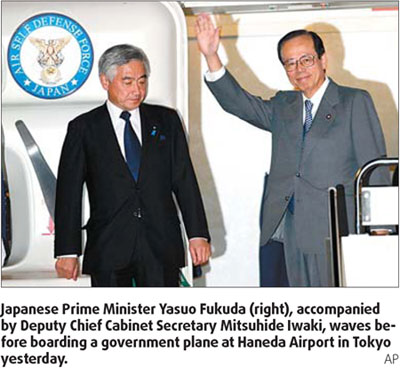Fukuda's US trip a difficult mission
Warm handshakes and smiles for the cameras will abound when US and Japanese leaders meet today for the first time since Japanese Prime Minister Yasuo Fukuda took office, but the brief summit stands little chance of resolving the security headaches bedevilling the alliance.
Japan's stalled naval mission in support of US-led operations in Afghanistan and Tokyo's worries over Washington's warming ties with the Democratic People's Republic of Korea (DPRK) will top the agenda when Fukuda makes his diplomatic debut at a summit in Washington with US President George W. Bush.
The 71-year-old Japanese leader, who took over in September when his predecessor suddenly quit, is likely to come back empty-handed to Tokyo, where a standoff with opposition parties controling parliament's upper house is paralyzing policy.

To the dismay of US policy makers, Japan was forced this month to halt its refueling mission for US and other ships patrolling the Indian Ocean after opposition parties refused to agree to a new bill to allow the operations to continue.
For its part, Tokyo fears that Washington may further improve its ties with the DPRK in talks over Pyongyang's nuclear program, leaving Tokyo out in the cold in its spat with Pyongyang over the fate of Japanese nationals kidnapped by DPRK agents decades ago.
Fukuda said he would have "frank" talks with Bush to boost bilateral ties.
"Unless we have solid Japan-US relations, we can't fix our diplomatic stance on Asia," Fukuda said shortly before leaving for Washington. "We must strive to further strengthen Japan-US relations and expand bilateral exchanges. Based on that premise, we want to proceed with our Asia diplomacy."
Norihiko Narita, a political science professor at Surugadai University, who served as an aide to former prime minister Morihiro Hosokawa in the early-1990s, when US-Japan relations were also fraught, said Fukuda was on a particularly difficult diplomatic mission.
"I can't recall in my memory a Japan-US relationship so full of problems," he said.
"The US visit is going to be a heavy burden for Fukuda," Narita added. "He faces a tough domestic political situation, so his options are very limited."
Parliament's lower house this week approved a government bill to restart the naval mission, but its enactment is far from certain given that the main opposition Democratic Party and its smaller allies, who can delay legislation, are against it.
"The passage in the lower house is a 'gift' that Fukuda can bring to Bush, but it is a very small one," said Toshikazu Inoue, a political science professor at Gakushuin University.
The ruling coalition could use its two-thirds majority in the lower house to override an upper house vote, but the rarely used tactic could spark a backlash and even trigger a snap election.
Agencies
(China Daily 11/16/2007 page6)












